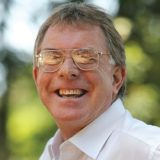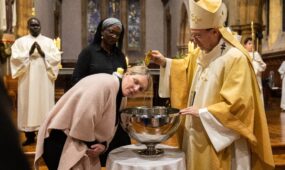Proclaimer of the truth
Opinion
There’s so much we could say about Pope Benedict XVI and so much we can learn from him, writes Vicar General FR DEAN MARIN who presided at his Memorial Mass in Adelaide.

Firstly, we would remember the superficial press coverage that Cardinal Ratzinger received on becoming Pope. As head of the Congregation for the Doctrine of the Faith he was presented as a ‘hardliner’ and the ‘the Pope’s rottweiler’. But can you remember his very first encyclical letter, and what it was called: Deus Caritas Est (God is Love)? He proclaimed the true meaning of love and challenged its fashionable imitations, but overall, in that letter he characterised the whole narrative of the Scriptures as a ‘love story’, an invitation into loving relationship with God, in Christ.
Advertisement
And in summing up the essence of our Christian faith he said in a speech to pilgrims to Vatican City in 2008: ‘Christianity is not a new philosophy or morality. But an encounter with the risen Lord. It is only in this encounter that we truly become Christian.’ Are these the words of a man only interested in enforcing doctrine and morals?
The young Fr Ratzinger was a peritus, a theological advisor, to Cardinal Josef Frings of Cologne at the Vatican Council in the 60s. He held the balanced approach that the Council represented a continuity with the past and not a rupture from it. He expressed this by his emphasis on returning to the Scriptures and Fathers of the Church, which is called ‘ressourcement’.
When others were more interested in ‘aggiornamento’, that is, updating and changing the Church to suit modern times, he understood, that this would happen by revisiting and returning to the sources and applying them anew to a changing world. Even in a fast-changing modern world, you still need to know where you come from, if you want to know where you’re going.
With his brilliant intellect, and with his predecessor John
Paul II, he understood the essential combination and partnership between faith and reason. Just one example of this was his approach to Scripture. He was an excellent Scripture scholar, and no fundamentalist. His series of books completed while Pope, Jesus of Nazareth, showed this quite clearly. Though he understood and used the ‘historical-critical method’ of interpretation because ‘it is of the very essence of biblical faith to be about historical events’ he could also see beyond it and saw its limits. He called for and used what is called ‘canonical exegesis’ that is, interpreting Scripture in the totality of the whole Scriptures and in the context of the living faith tradition. No sterile, purely rational approach here.
I return to his role at the Vatican Council and in particular to the writing of the last document which was Gaudium et Spes, the Pastoral Constitution of the Church in the Modern World. Yes, the Council needed to look outwards, understand and accept the good features and dialogue for greater understanding of the modern world, yet it seems that there was a temptation to be too optimistic about all things modern and new. I quote from The Vision of Vatican II by Australian theologian, Ormond Rush, when he says ‘periti such as Rahner and Ratzinger were co-opted to drafting sub-commissions…precisely to bring greater theological balance to the text…’ And so, the final text speaks of ‘original sin, of diabolical influences in the world, of anxiety, suffering and death, and of the ruinous effects of personal sin’. Rush puts this down to Ratzinger’s emphasis on St Augustine’s theology as complementary to the theology of St Thomas Aquinas.
Resigning from the papacy as he did in early 2013 will leave a lasting lesson for us. There’s so much here to ponder. Divine symbolism is powerful (it’s at the heart of our belief in the sacraments) and from a human point of view there’s status and influence that goes with it, but he didn’t cling to it. He understood that, no longer physically and mentally able to express the meaning of that symbolism in practice, he should let it go. And in retiring to a quiet life of prayer in the Vatican Monastery he expressed another aspect of the divine that we all can share, that is, of the power of our prayer for each other and of a deeper unity and connection that it fosters for us in Christ.
Advertisement
In standing for objective truth, Benedict was prophetic in challenging modern Western cultures, like ours, in Australia. He could see what was happening. In my words, we are drowning in a sea of relativism where all options and choices are of equal value. The latest incantation of this of course is ‘my truth’. He could see that Western nations, founded on Christian principles and values, were running on empty and open only to the latest fashionable ideologies, if they abandoned their Christian foundations. But as
Fr Frank Brennan wrote in his recent article in The Australian, Benedict shares the hope and optimism of our faith when he said ‘there will be a certain sense in this Western world a crisis of our faith, but we will always also have a revival of the faith because Christian faith is simply true’.
May Emeritus Pope Benedict pray for us to have the same unwavering hope in living and proclaiming the truth of the Christian faith.








Comments
Show comments Hide comments